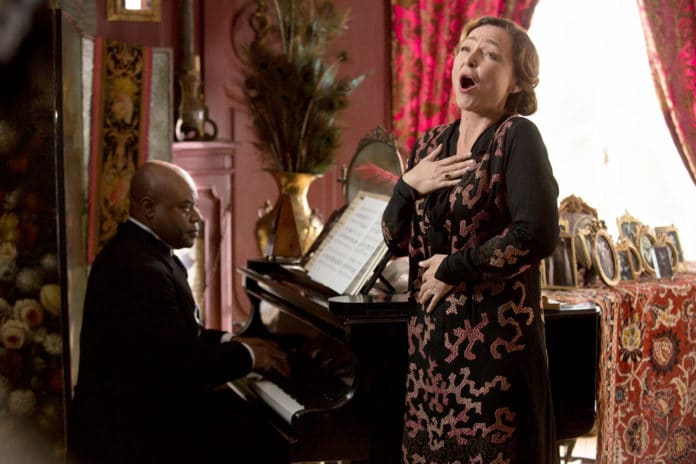There’s a line in “Marguerite” – a strangely moving story of a wealthy heiress whose passion to sing opera is matched only by her profound tone-deafness – that put me in mind, ever so briefly, of a corny old joke. When Marguerite (Catherine Frot) is rendered temporarily mute by a malady of the vocal cords, her husband (André Marcon) turns to the doctor and asks, with great solicitousness, “Will she ever sing again?”
Now, if this movie were interested only in going for the easy laugh – and, to its credit, it isn’t – that doctor would have replied, as in the joke, “I don’t see why not.” To which the husband would have said, after a suitable pause for comedic effect: “That’s funny. Because she never could before!”
The actual dialogue doesn’t bear repeating, if only to avoid spoilers. But it does run counter to expectation, like the rest of this off-kilter French film, based loosely on the life of talentless song thrush Florence Foster Jenkins (1868-1944). Although there are moments of real humor, mainly having to with Marguerite’s painfully obvious inability to carry a tune, the movie is less funny ha-ha than it is poignantly, perplexingly wry. If we’re invited to laugh at Marguerite from time to time, we’re also given the opportunity to understand her, or to at least care enough to try.
That’s the far more daunting task. How is it that Marguerite can be so clueless about her own ineptitude? In the end, the movie gives voice not just to Marguerite’s deficiencies as a singer but also to emotional frailties that are too human and familiar.
When we first meet our heroine, she’s preparing to give a recital for the dilettantish amateur music club of which she is a patron and outside of which she has never performed. But after two young men – one a jaded newspaper critic, the other a nose-thumbing avant-gardist – hear her squawky, bleating interpretation of Mozart, they decide to use Marguerite to further their own ends.
The writer, Lucien (Sylvain Dieuaide), publishes a humorously equivocal review – writing that Marguerite “seemed to be trying to exorcise an inner demon” – in order to obtain her patronage; his anti-bourgeois friend, Kyril (Aubert Fenoy), invites Marguerite to sing in a dadaist cabaret he has mounted.
Marguerite, who may be clueless but is not dumb, has some idea that she is being exploited. Later in the film, as she rehearses for her professional stage debut – an inadvisable undertaking for which she hires a sycophantic voice coach (Michel Fau) – she remarks to Lucien that “I thought you wanted to use me.”
“I did,” he tells her, “but one grows fond. It’s silly.” By that point, he has become her friend and feels more protective than predatory.
What’s most unexpected is how skillfully director Xavier Giannoli guides us through a similar transformation. In the beginning of the film, it’s hard to empathize with Marguerite. We feel more for her husband, who has been driven into the arms of a mistress (Astrid Whettnall) by his wife’s absurd ambitions.
But as the tale progresses, we grow, like Lucien, more and more fond of Marguerite. It is actually the mistress who gives us insight into the character, when she points out, quite aptly, how the singer’s stubborn pursuit of the spotlight may be motivated by a desire to be fully seen – and heard – by her husband.
In the end, “Marguerite” isn’t a comedy so much as a love story. True love, it seems, isn’t just blind; it must be deaf, too.
—
Three stars. Rated R. Contains brief graphic nudity, a sex scene and coarse language. In French with subtitles. 127 minutes.
Ratings Guide: Four stars masterpiece, three stars very good, two stars OK, one star poor, no stars waste of time.






